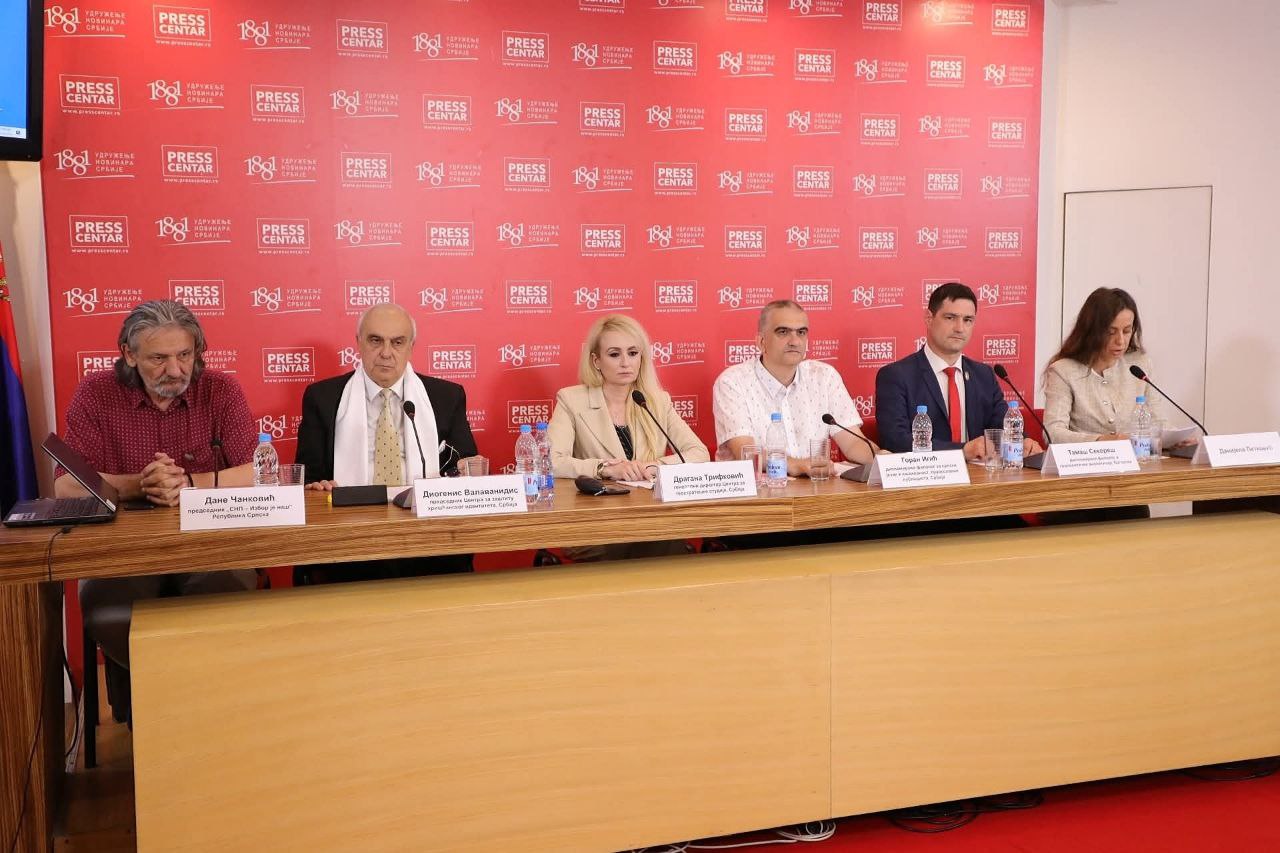The Center for Geostrategic Studies organized an International Conference on June 30, 2025, at the Belgrade Press Center, entitled: „The Church and Schisms, Abuse of Religion for Geopolitical Purposes.“
Dragana Trifković, Director General of the Center for Geostrategic Studies, Serbia, spoke on the topic “Patriarch Bartholomew, an accomplice of world powers in the attack on Orthodoxy”. She emphasized that Patriarch Bartholomew I is a supporter and successor of the idea of elevating the Patriarchate of Constantinople through the consistent destruction of local churches, which originated with Patriarch Melentios Metaxakis. Criticizing the creation of schism in Orthodoxy, she noted that “the persecution and suffering of the Ukrainian Orthodox Church was caused by the direct intervention of Patriarch Bartholomew, on whose hands is the blood of the martyred bishops, priests and believers of the Ukrainian Orthodox Church”.
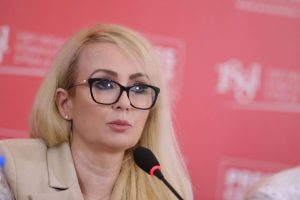
Photo: Dragana Trifković, Director General of the Center for Geostrategic Studies
In the final part of her speech, Trifković concluded, “Bartholomew I, who wanted to gain fame as a restorer of the canonical order and a unifier of Christians, will go down in history as an accomplice in the attack on Orthodoxy and the persecution of his co-religionists. It is necessary to take the most decisive action against Bartholomew and to openly expose his anti-canonical activities, because it is obvious that he will not stop carrying out his aggressive undertakings.”
Dragana Trifković informed the public that at the request of Greece, she was banned from entering the Schengen zone for three years, which illegally violated her basic human rights and that Patriarch Bartholomew was directly behind such an action by Greece, and he will have to answer before the European Court of Human Rights.
The Ukrainian Orthodox Church prepared a video for the conference titled „The Seizure of UOC Temples by Radical Nationalists,“ which depicts the violence committed by members of the OCU against this, the only canonically recognized church in Ukraine.
Video of the seizure of UPC churches by members of the OCU and radical extremists
After that, the director of the Center for Geostrategic Studies, Dragana Trifković, read the address of His Eminence Metropolitan Luka of Zaporozhye and Melitopol entitled “Appeal to the Hierarchs of the Local Orthodox Churches”
His Eminence Metropolitan Luka of Zaporozhye and Melitopol pointed out in the Appeal that in January 2019, the Patriarch of Constantinople signed a tomos on autocephaly for the newly created organization, which he called the “Orthodox Church of Ukraine”. “With one stroke of the pen, structures were legalized that the entire family of Orthodox churches, including the Church of Constantinople, recognized as non-canonical. This was done against the will and desire of millions of Orthodox Ukrainians, faithful children of the Ukrainian Orthodox Church, who have repeatedly asked the First Hierarch, who is in Istanbul, not to take such a step, because such actions will inevitably lead to an even greater schism in Orthodoxy in Ukraine, as well as a direct attack on the canonical Ukrainian Orthodox Church. To our great regret, the head of the Phanar did not listen to anyone. As a result, a catastrophe broke out in the church sphere of Ukraine, which spread to the entire Orthodox Church,” Metropolitan Luka emphasized.
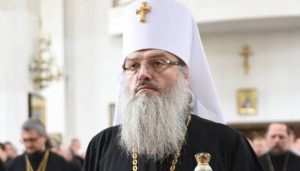
Photo: His Eminence Metropolitan Luka of Zaporozhye and Melitopol
He noted that representatives of the UOC have repeatedly addressed Patriarch Bartholomew with a request to end the plundering actions of his “spiritual children” from the “Orthodox Church of Ukraine”. “Considering that such requests addressed to the Primate of the Church of Constantinople have not been heeded before, I call on you, dear brothers in Christ, to raise your voice in support of our Church!”, emphasized Metropolitan Luka.
Diogenis Valavanidis, President of the Center for the Protection of Christian Identity, spoke on the topic “Opening the Door Widely to the Antichrist”. In his speech, he criticized the anti-Christian discourse of the Brussels bureaucracy. „A particular difficulty is also created by facing the reality, in which the highest political authorities of the EU (European Union), primarily the President of the EC (European Commission) Ursula von der Leyen, convince us that the stability of European culture and civilization is inherited on the foundations of the Talmud, which represents the most famous work of Jewish literature from the first centuries of the Christian era, and today in which Christians are characterized as a „hated sect“, while the description of the figure of Jesus Christ is blasphemously distorted. Unequivocally, this is an attempt to change the genetic code and identity card of the people of Europe,“ Valavanidis pointed out.
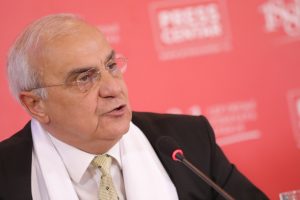
Photo: Diogenis Valavanidis, President of the Center for the Protection of Christian Identity
He also informed the public that on May 16, the “Center for the Protection of Christian Identity” from Belgrade sent a renewed public appeal to Patriarch Bartholomew I of Constantinople for the salvation of the unity of the Orthodox Church. “The appeal pointed to the paramount fact that the realization of the destruction of the unity of the Orthodox Church began with the attack on the canonical Ukrainian Orthodox Church, for which the Ukrainian Parliament later passed a law banning its activities, which is in fact a consequence of the granting of the Tomos by the Patriarchate of Constantinople on autocephaly to the schismatic Orthodox Church of Ukraine,” Valavanidis noted.
Victor Zhosu, editor-in-chief of the Orthodox journalists’ portal “Tradition” from Moldova, spoke on the topic “Church Schism in Moldova: Between Politics and Ethnophyletism.” Zhosu noted that the schism in Moldova began in 1992, when a small group of priests from the Moldovan Metropolis of the Moscow Patriarchate began to group around the Vicar Bishop of Beltsy, Petru Peduraru. “Their activity was encouraged by politicians. Thus, the Popular Front of Moldova directly supervised the process of schism. Its representatives also participated in meetings of priests, in every possible way urging them to separate from the Russian Orthodox Church. At the same time, the Popular Front was a nationalist organization, which already then advocated the unification of Moldova with Romania. At the end of 2007, the Romanian Orthodox Church established four dioceses within the so-called Bessarabian Metropolis, which received its assessment not only from the Moscow Patriarchate, but also from other Local Churches,” Josu emphasized.
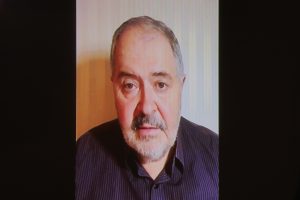
Photo: Victor Zhosu, editor-in-chief of the Orthodox journalists’ portal “Tradition”
In the concluding part of his speech, Victor Zhosu spoke about the importance of the upcoming parliamentary elections in Moldova, which are scheduled to be held in September this year. “If, as a result, the current government is preserved, a law can be passed prohibiting the Orthodox Church of Moldova if it does not break canonical ties with the Russian Orthodox Church. But we understand that breaking canonical ties means entering into a schism,” Zhosu concluded.
Goran Igić, a graduate philologist in Serbian language and literature, an Orthodox publicist from Serbia spoke on the topic “The Influence of Antoni Jerkov on the Schisms in the Canonical Territory of the Serbian Orthodox Church.” He pointed out that: „Antonio Jerkov, both in the case of the Croatian Orthodox Church during the period of the Independent State of Croatia, and in the case of the Macedonian Orthodox Church after World War II, acted to break the territorial-canonical order of the Serbian Orthodox Church, and he is not of the Orthodox faith, but a Roman Catholic, who interfered in intra-Orthodox issues in a sophisticated way with the support not only of the Vatican, but also of the political authorities in Belgrade.“
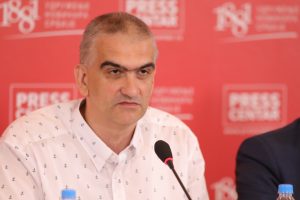
Photo: Goran Igić, graduated in Serbian language and literature, Orthodox publicist
Continuing his address, Goran Igić expressed his belief that the hasty recognition of the autocephaly of the Macedonian Orthodox Church on June 5, 2022, was made by the Serbian Orthodox Church under political pressure. „I disagree with the statement of Serbian Patriarch Porfiry, which he gave in early May this year in an interview with the Russian Orthodox portal Bogoslov.ru, when he said that „historically, from a canonical point of view, the dioceses on the territories of present-day North Macedonia have never belonged to the Serbian Orthodox Church, except in the period from 1920 to 1965/6/7.“ „To tell the public the truth, the Skopje Diocese was part of the Serbian Archbishopric of Peć at the latest during the reign of King Milutin, because King Milutin moved the capital to Skopje. The Polog or Tetovo Diocese, then the Debar Diocese, and the Lesnovo Diocese were all part of the Serbian Orthodox Church during the Nemanjić era,“ concluded Igić.
Tatjana Stojanović, a military correspondent and journalist in Russia, representative of the Eurasian Journalists’ Forum from Serbia, spoke on the topic „Tendential Destruction of Churches in the Russian Borderlands.“ She pointed out, „During the hostilities in the border regions of Russia, especially in the Kursk region, which was invaded by the Armed Forces of Ukraine, Orthodox churches and monasteries were repeatedly used for military purposes, which led to their destruction and desecration. These actions have drawn condemnation from both religious organizations and international observers.“
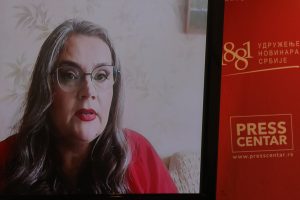
Photo: Tatyana Stoyanovich, military correspondent and journalist in Russia
On the one hand, the Ukrainian army used churches as military facilities, on the other hand, it purposefully demolished and destroyed them. In the first case, the churches were used as control points for drones, weapons depots and medical posts. The Ukrainian command was guided by the idea that the Russian army would not strike religious objects.
Tatyana quoted the words of the American Orthodox priest Seraphim Bell, who is now serving in Russia, “One of the subtexts of the coup that the Americans organized in Ukraine in 2014 was the use of the UOC against Russia. The first step was an attempt to separate it from the Moscow Patriarchate. That did not work. But they managed to put pressure on the Patriarch in Constantinople, and he created the so-called Orthodox Church of Ukraine (OCU).” Stojanović concluded that the destruction and desecration of Orthodox churches by the Ukrainian army in the Russian border areas is not only a war crime, but also part of an ideological and civilizational conflict.
Tamás Székeres, a graduate philologist and geopolitical analyst from Bulgaria, spoke on the topic “The Role of the Bulgarian Orthodox Church in Contemporary Politics in the Balkans”.
“In the contemporary context of moral decline, globalist pressure and geopolitical conflicts, the Bulgarian Orthodox Church is regaining its natural role as the spiritual pillar of the Bulgarian nation and a potential balancer in the Orthodox world,” Székeres emphasized. He believes that “The categorical refusal to participate in the 2016 Council of Crete was a clear sign of the BOC’s disagreement with the papist attempts of the Phanar Patriarch Bartholomew to centralize the Orthodox world. With this, the Bulgarian Orthodox Church joined the Russian Orthodox Church, the Serbian Orthodox Church, and the Church of Antioch in the so-called Traditionalist Orthodox Bloc.”
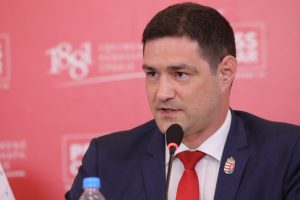
Photo: Tamas Szekeres, graduate philologist and geopolitical analyst
“With the election of Patriarch Danilo in 2024, the Bulgarian Orthodox Church has gained a spiritual leader with a clearly expressed Orthodox conservatism. The Patriarch is known for his categorical statements against ecumenism and liberal theology, his support for catholicity and canonicity as the foundation of the Orthodox hierarchy, and the moral firmness and spiritual sobriety in his public messages. He is a symbol of traditionalism without fanaticism and spiritual struggle without political servility,” concluded Szekeres.
Dane Čanković, president of the “Serbian People’s Movement – The Choice is Ours” from Republika Srpska, spoke on the topic “The Phanar on the Same Side as Those Who Destroy Religion.” Čanković pointed out that „an increasing number of Greek media outlets have recently been writing that Patriarch Bartholomew made a big mistake by granting the tomos to the Ukrainian schismatics, and that now the official Phanar is also becoming aware of this fact. Bartholomew is looking for a way to correct his mistake, which has greatly damaged his authority in the international arena. Bartholomew is beginning to admit the fact that the project of creating a non-conformist structure in Ukraine has failed, because the Ukrainians have not justified his wishes and plans.“
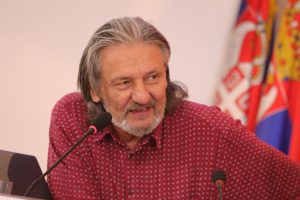
Photo: Dane Čanković, president of the Serbian People’s Movement – The Choice is Ours
He believes that „The negative practice of granting tomos to Ukrainian schismatics was attempted to be transferred to the Baltic countries, where some schismatics saw a possible chance for the formation of new schismatic structures in these countries according to the Ukrainian scenario. The current situation publicly demonstrates the absolute correctness of the decision of the Serbian Patriarchate and Patriarch Porphyry, who from the very beginning pointed out the wrongness of Patriarch Bartholomew’s decision to grant the Ukrainian schismatics a tomos of independence,“ Čanković emphasized.
„Bartholomew, seeing the wrongness of his decisions, which broke the unity of the Orthodox Churches, is trying to correct the catastrophic situation through other local Orthodox Churches and is therefore seriously considering withdrawing the tomos from the Ukrainian schismatics,“ Čanković concluded.
Source: Center for Geostrategic Studies
Conference Recording: International Conference: Church and Schisms, Abuse of Religion for Geopolitical Purposes
July 1, 2025

